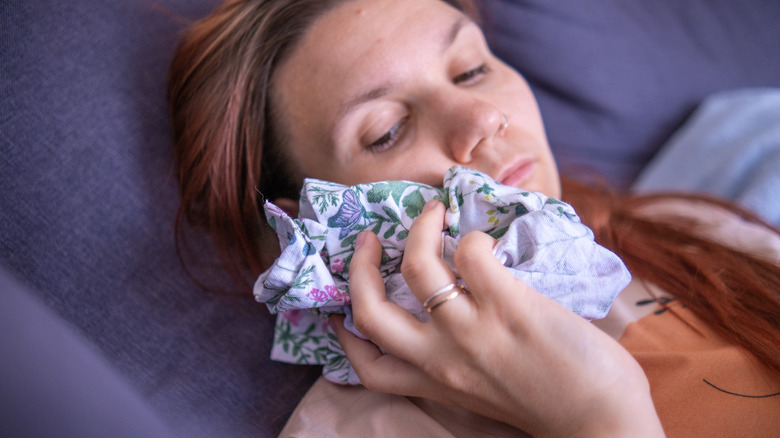What It Means When Your Jaw Locks
Not only does our jaw provide us with structural support for our teeth and face, but it also aids in essential functions, such as talking and chewing. In order to do so, our jaw is able to move about freely. But is it possible for our jaw to lock down like a Venus flytrap?
Otherwise known as trismus, lockjaw was previously considered unique to tetanus infections, according to an updated 2022 scientific review published in StatPearls. The definition of trismus has expanded to include difficulty opening the mouth for any number of reasons. While most cases are short-lived (lasting no more than an average of 14 days), some people find that their jaw locks in place on an ongoing basis. This can make speaking, swallowing, and eating challenging. It may also increase one's risk for oral health problems.
In addition to a limited range of motion, symptoms of trismus often include pain, cramping, headaches, or earaches. When your jaw locks, it may mean that an underlying health condition might be present.
Lockjaw may be related to dental health
Typically, a person can open their mouth approximately 40 to 60 centimeters (cm). While a number of factors will influence how widely one can open their mouth, anything less than 35 millimeters (mm) medically qualifies as lockjaw.
Sometimes, the cause of your jaw locking may be tied directly to the jaw itself. Such is the case for those with temporomandibular disorders (TMD), in which the temporomandibular joint (TMJ) is not functioning properly. Those with TMD may experience pain, clicking or popping of the jaw, or trismus. Alternate causes for lockjaw may include certain types of dental infections, including pericoronitis. Pericoronitis is characterized by tissue inflammation due to an erupting or partially-erupted tooth, particularly the wisdom teeth (via StatPearls). While it's not uncommon for patients to experience lockjaw following wisdom teeth removal, the discomfort is often temporary. This can also be the case if local anesthesia was mistakenly injected into the masticatory muscles within the jaw.
Other health conditions and treatment methods
There are other health conditions that can cause your jaw to lock that aren't directly correlated with dental health. For example, although rare, a jaw that locks can potentially be a sign of cancer (via StatPearls). Patients should be looked at by a specialist if they experience certain symptoms, such as neuralgia, lesions, or are unable to open their mouth beyond 15 millimeters. Similarly, trismus can also be a side effect of certain head or neck cancer treatment methods, including surgery or radiation.
Alternatively, a lesser-known cause of lockjaw can be a calcium deficiency, medically referred to as hypocalcemia, according to experts at the Dental Implant and Specialist Centre. Certain medications are not out of the question either, as some nausea medications or antipsychotic drugs have also been associated with trismus.
Depending on the cause of your locked jaw, treatment options may differ. However, many patients can be treated with physical therapy and medication, including muscle relaxants to relieve spasming. In severe cases, surgery or corrective devices may be needed. To help relieve the discomfort at home, try utilizing either a warm or cold compress or massaging the area. Alternatively, stick to softer foods and be sure to drink plenty of fluids.



